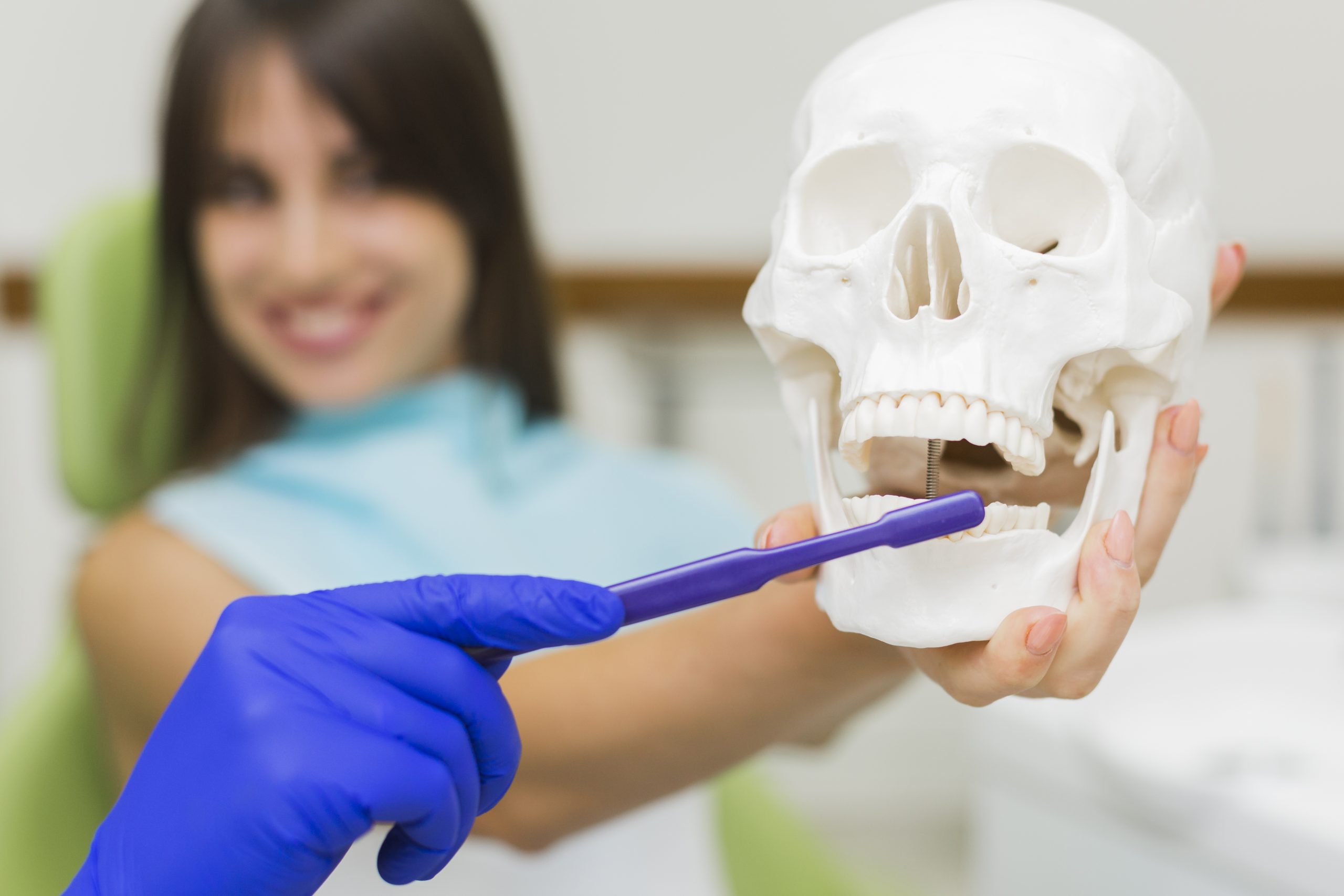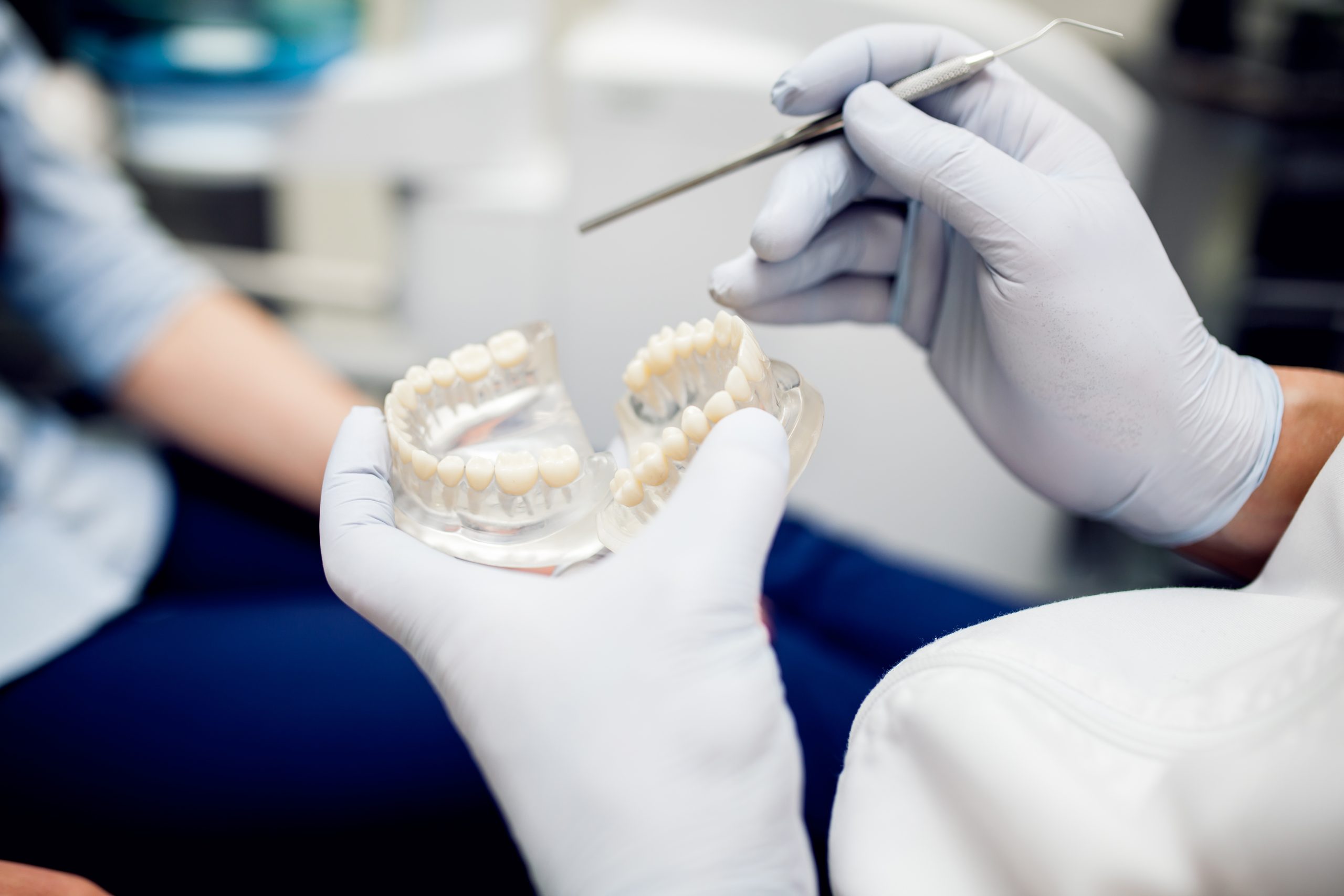Getting dentures is an essential step in restoring your ability to chew, speak, and maintain facial structure after tooth loss. For many, it also supports day-to-day comfort and function. However, adjusting to wearing dentures often takes time, especially in the first few weeks.
You may be wondering, “Are dentures difficult to live with?” It’s a common question, especially during the early stages of wearing them. While challenges like denture discomfort, difficulty eating, or the sensation that dentures feel loose can occur, many of these concerns ease as your mouth adjusts.
This guide explores some of the most common denture problems and offers practical tips to help you manage them. Whether you’ve just started to wear dentures or are going through the adjustment phase, you’re not alone, and small changes can make daily life with dentures more manageable.
- Dentures can help restore comfort and function, but they require daily care and routine maintenance to remain effective and support overall oral health.
- Good denture care reduces the risk of issues such as staining, odour, irritation, or infection that may affect the gums or surrounding tissues.
- Daily cleaning involves rinsing dentures after meals, brushing them gently with a soft brush, avoiding hot water, and using non-abrasive cleansers rather than regular toothpaste.
- Safe cleaning products include denture tablets, mild soap, or denture paste, while harsh products such as bleach or whitening toothpaste should be avoided.
- Removing dentures overnight allows the gums and mouth to rest, and soaking them in water or a cleaning mixture helps maintain their shape and integrity.
- Signs of wear include cracks, looseness, sore spots, discolouration, speech changes, or difficulty chewing, which may indicate it’s time to see your dental professional for assessment or possible relining.
Why Proper Denture Care Matters
Taking the time to care for your dentures each day supports more than just their appearance. It plays a key role in supporting your oral health and comfort. When denture cleaning is overlooked, harmful bacteria and food particles can accumulate on the denture surfaces and along the gums.
Without consistent denture care, you may notice unpleasant odours, stains, and even irritation in your mouth. In some cases, poor hygiene may contribute to mouth irritation or infection, especially when dentures are worn overnight or not cleaned thoroughly. These issues can affect how dentures fit and feel and may increase the risk of inflammation or sores.
Keeping your dentures clean helps reduce plaque, maintain freshness, and minimise the build-up of other deposits. It also protects any remaining teeth if you’re wearing partial dentures. Like natural teeth, removable dentures require daily attention to maintain good condition.
Maintaining denture cleanliness isn’t only about comfort. It is an essential part of caring for your mouth, supporting your ability to eat and speak clearly each day.
Daily Cleaning Tips for Dentures
Keeping your dentures clean each day helps support their function and freshness. Whether you wear full or partial dentures, daily cleaning helps remove plaque, food, and other deposits that may impact oral cleanliness and denture condition. Below are simple steps you can follow at home to support your oral hygiene and denture condition:
- Rinsing after meals:
Remove and rinse your dentures with cold water after eating to remove loose food particles and help minimise plaque build-up. Holding them over a hand basin half-filled with water or a towel can help prevent damage if dropped. - Brushing with a soft denture brush:
Use a soft denture brush or a soft-bristled brush to clean your dentures at least once a day, gently. Focus on all surfaces, including the area that rests against the gums and the roof of your mouth. This removes plaque, stains, and other deposits that can contribute to bad breath or discomfort. - Avoiding hot water:
Never use hot or boiling water to clean or soak dentures. Excess heat can damage the denture material, changing its shape or causing it to crack. Always use cool or lukewarm water during cleaning and soaking. Avoid rinsing with hot water, as it may warp or weaken dentures, especially those made with plastic or metal components. - Using non-abrasive cleaners (avoid regular toothpaste):
Regular toothpaste, especially whitening toothpaste, can be too abrasive and may scratch the denture surfaces. You can clean your dentures with mild soap, a purpose-made denture paste, or commercial denture cleansers. Always follow the manufacturer’s instructions when using specialised cleaning products. Rinse your dentures carefully after using any cleaning product, and then place them back in your mouth.
Cleaning Products to Use and Avoid
Choosing the right products for denture cleaning helps maintain their condition and keep them clean and in good shape. Suitable options include denture tablets, mild soap, or non-abrasive cleansers specifically designed for dentures. These products help remove plaque and other deposits while minimising the risk of damaging the denture material.
Some products can harm your dentures and should be avoided. Ordinary toothpaste, particularly that labelled as whitening, can be harsh and may cause tiny scratches on the denture surfaces over time. Household cleaners, such as bleach or strong chemicals, can weaken or discolour the plastic and metal used in partial dentures.
Night-Time Denture Care
Removing your dentures overnight gives your gums, tongue, and the roof of your mouth a chance to rest. Wearing dentures constantly may lead to discomfort or mouth irritation.
Place your dentures in a cleaning mixture or cold water while you sleep. This helps keep their shape and reduces the risk of drying out. Always use a clean, dry container with a secure lid when storing your dentures carefully overnight.
Denture Care and Maintenance Tips Over Time
Daily cleaning is important, but long-term care habits also help preserve the fit and function of your dentures. Developing these routines supports good oral hygiene and denture condition. Here are some practical ways to maintain your dentures over time:
- Handle dentures carefully:
Hold them over a hand basin filled with water or a towel during cleaning to minimise the risk of breakage if they are dropped. - Soak when not in use:
Place dentures in cold water or a cleaning compound when not worn. This helps reduce the risk of drying out or losing shape. - Brush gently every day:
Use a soft denture brush or a soft-bristled toothbrush to gently remove plaque, stains, and other deposits without scratching the denture material. - Maintain healthy tissues:
Gently clean your gums, tongue, and the roof of your mouth to keep the tissues clean and comfortable. - Eat soft foods if sore:
When you experience irritation or sores, eating soft foods such as yoghurt, mashed vegetables, or scrambled eggs can make eating more comfortable. Ongoing issues should be reviewed by your oral health professional. - Schedule regular dental check-ups:
Visit your dentist at least once a year, or more frequently if you experience discomfort, looseness, or visible wear. Routine visits enable adjustments, relining, and an assessment of your oral health.
Signs of Wear or Damage to Watch For
Over time, dentures can change due to daily use, natural changes in the mouth, or the ageing of the denture material. Recognising early signs of wear helps you keep your dentures functioning well and maintain good oral hygiene. If you notice any of the following, it may be time to consult your dentist:
- Cracks or chips:
Small fractures in the plastic or metal framework can collect food and bacteria, making cleaning more difficult and increasing the likelihood of hygiene problems or irritation. - Looseness:
Ill-fitting dentures may shift when you speak or chew, causing irritation and making it harder to eat some foods. - Discomfort or sore spots:
Persistent pain, redness, or sores along the gums or cheeks may indicate that the dentures should be assessed by your dentist for possible adjustment or relining. - Changes in speech:
If you develop a sudden lisp or difficulty pronouncing certain words, it may mean your dentures no longer fit properly. - Difficulty chewing:
Trouble breaking down food or avoiding certain textures may signal wear that affects how your dentures function.
Spotting these changes early allows your oral health professional to recommend adjustments, relining, or replacement when needed, helping you maintain function and proper fit.
Importance of Routine Dental Visits
Even if you wear complete dentures, it’s still essential to visit your dentist regularly. These dental visits aren’t just about the dentures themselves. The dental appointments also allow for checks of the gums, tongue, and surrounding tissues for any changes or areas of concern.
Routine care may include adjustments to enhance fit, relining to help improve comfort, or advice on managing any soreness or irritation. Regular visits also provide patients with the opportunity to ask questions about denture maintenance, oral hygiene, or eating effectively with dentures.
When Is Denture Relining Needed?
Denture relining is a process in which the inner surface of your dentures is reshaped to enhance their fit against the gums. Over time, natural changes in the mouth, such as bone resorption, weight loss, or ageing, can affect the fit. Poorly fitting dentures may cause discomfort, soreness, or looseness while eating or speaking.
If you notice these changes, it may be time to discuss denture relining with your oral health professional. Relining can help improve the fit and help extend the life of your dentures.
Types of Relines
There are various approaches to relining, and the chosen type depends on the condition of the gums, individual needs, and the desired duration of the adjustment.
- Soft reline:
This process uses a flexible, cushioning material that is applied to the inner surface of the denture. This option is often recommended for individuals with sensitive gum tissue or those who frequently experience sore spots. Soft relines offer a cushioning effect but generally need replacement more often than hard relines. - Hard reline:
A rigid acrylic material is used to reshape the inner surface of the denture. This option is more durable than a soft reline and can improve stability and function. Hard relines last longer but may feel firmer for people with sensitive gums.
What to Expect During a Reline Appointment
Relining is a routine procedure carried out by dental professionals. The process may vary slightly depending on whether the work is completed in the clinic or requires a dental laboratory, but it generally follows these steps:
- Examination:
The dentist will check the condition of your mouth and existing dentures to identify pressure points, sore areas, or looseness. - Impression taking:
A new impression of your gums is made to capture their current shape and any changes that have occurred since the dentures were first fitted. - Application of reline material:
The impression guides the placement of either soft or hard reline material, which is bonded to the fitting surface of the denture. - Adjustment and polishing:
The relined denture is adjusted for fit and polished before being returned for use.
Most relines can be completed in a single appointment, typically within an hour. In some cases, dentures may need to be sent to a dental laboratory, which means patients might be without them for part of the day.
Common Denture Care Mistakes to Avoid
Caring for dentures properly helps reduce discomfort and keeps them functioning as intended. Some habits, however, may shorten their lifespan or impact their cleanliness and performance. Here are mistakes to watch out for:
- Using abrasive toothpaste:
Regular or whitening toothpaste can scratch the denture surface. These scratches may hold plaque and stains, making cleaning more difficult over time. - Not rinsing after meals:
Skipping a quick rinse allows food particles to remain on the dentures, which can cause odour and make cleaning more difficult over time. - Skipping regular dental appointments:
Even with complete dentures, routine check-ups are important. A dentist can assess fit, check for tissue changes, and provide adjustments before problems become painful. - Trying DIY adjustments:
Using files, glue, or household tools can damage the denture material. Any adjustments should always be done by a qualified dental professional.
By avoiding these mistakes, denture wearers can keep their dentures in good condition, extend their lifespan, and promote better oral hygiene.
Final Thoughts
Consistent cleaning, proper maintenance, and regular dental check-ups play an important role in keeping dentures functional and in good condition. Daily care and routine visits also help maintain oral hygiene and denture condition. Ongoing care for dentures helps reduce the chance of irritation or damage and makes speaking and eating easier.
If you’d like personalised guidance on caring for your dentures, whether that involves daily cleaning, long-term maintenance, or relining, we welcome you to book a consultation at Karrinyup Dental Centre. During your visit, a dentist can assess the fit of your dentures, evaluate your oral health, and recommend options to maintain proper fit and function.





